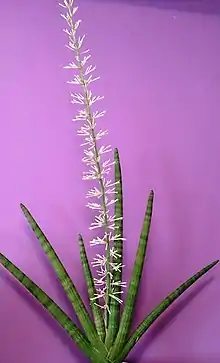| Dracaena angolensis | |
|---|---|
 | |
| Scientific classification | |
| Kingdom: | Plantae |
| Clade: | Tracheophytes |
| Clade: | Angiosperms |
| Clade: | Monocots |
| Order: | Asparagales |
| Family: | Asparagaceae |
| Subfamily: | Nolinoideae |
| Genus: | Dracaena |
| Species: | D. angolensis |
| Binomial name | |
| Dracaena angolensis | |
| Synonyms[1][2] | |
| |
Dracaena angolensis, synonym Sansevieria cylindrica,[1] also known as the cylindrical snake plant, African spear or spear sansevieria or in Brazil Saint Bárbara sword,[3] is a succulent plant native to Angola. Formerly in the genus Sansevieria, it is now included in Dracaena.
Description
Dracaena angolensis has striped, elongate, smooth, greenish-gray subcylindrical leaves. They are up to 3 cm (1 in) diameter and grow up to 2 m (7 ft) above soil.[3] The spear sansevieria grows fan-shaped, with its stiff leaves growing from a basal rosette.
The species is interesting in having subcylindrical instead of strap-shaped leaves caused by a failure to express genes which would cause the cylindrical bud to differentiate dorsoventrally or produce a distinctive and familiar top and bottom surface to the leaf blade.[3][4] The 3 cm (1 in) greenish-white tubular flowers are tinged with pink.[4]
Cultivation
The species is drought-tolerant and in cultivation requires water only about once every other week during the growing season.[4] The species can be watered once a month during the winter months. The species was described by Wenceslas Bojer in 1837. Dracaena angolensis (under the synonym Sansevieria cylindrica) received its common name from a competition in a Dutch national newspaper.[3] It is popular as an ornamental plant[3] as it is easy to culture and take care of in a home if given bright sunlight and other required resources.[4]
Gallery of varieties and cultivars

 Kind known as "var. patula"
Kind known as "var. patula" Cultivar 'Boncel'
Cultivar 'Boncel'
References
- 1 2 3 "Dracaena angolensis (Welw. ex Carrière) Byng & Christenh". Plants of the World Online. Royal Botanic Gardens, Kew. Retrieved 2020-02-21.
- ↑ "Sansevieria angolensis Welw". The International Plant Names Index. Retrieved 2020-02-21.
- 1 2 3 4 5 Thongthiraj, Rahpee. "Get Inspired with Sansevierias: The Perfect Solution for Your Home Garden". California Cactus Center. Archived from the original on 2017-07-02. Retrieved 2017-07-02.
{{cite web}}: CS1 maint: bot: original URL status unknown (link) - 1 2 3 4 Lemke, Cal (2002-01-25). "Sanseviera cylindrica". Plant of the Week. University of Oklahoma Department of Biology and Microbiology. Retrieved 2008-04-02.